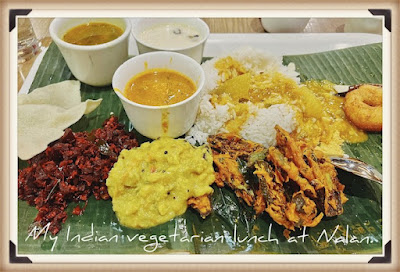I was having lunch at Nalan and catching up on my reading. Blinked when I saw an alert for a new cookbook to be released by established Indian food critic and American author Raghavan Iyer. Apparently when he began his career, there were only 20 Indian restaurants in New York City.
Kim Severson did an in-depth interview with 61-year-old Raghavan Iyer, published in The New York Times on February 21, 2023 — 'He Taught Americans to Cook Indian Food. Now He’s on His Final Chapter.' It was a lovely long read; the article is full of emotions and respect for the author and culinary arts educator.
Raghavan Iyer's latest and likely, final book recently published is titled, 'On the Curry Trail: Chasing the Flavor That Seduced the World in 50 Recipes' (28 February 2023).
Mr. Iyer says it will be his last. Colorectal cancer has invaded his brain and lungs. He’s been fighting it for five years, which is years longer than people with that type of cancer usually survive. He has endured thousands of hours of radiation and chemotherapy, endless scans and four surgeries with multiple complications.
The new book explores what curry powder is, and how it made its way around the world. Curry powder is an ingredient that has introduced many non-Indians to the cuisine but remains controversial among some members of the diaspora.
This was a book contract that he landed before his cancer diagnosis five years ago. While he struggled to finish the book by the deadline (he did it!), he saw it as a work of passion, a final representation of his ideals. He believes that he's had loads of extra time after the diagnosis and isn't afraid of dying. But hey, facing death is not a small matter. This is a book to celebrate "life, family, friends and food."
that he eats a vegetarian diet, practices yoga and was an avid swimmer have helped him make it this long, he said. So did idli, the spongy, beloved South Indian breakfast staple made by fermenting and steaming rice.
Reading this interview over an Indian vegetarian lunch at Nalan was pure chance, and utterly poignant. I couldn't help feeling a sense of loss for a stranger I don't know, but of which his recipes and name I'm slightly acquainted with.
Raghavan Iyer never claimed to host authentic methods of cooking Indian cuisine. Please, none of us could cook like our grandmothers or even faithfully follow their methods. I swear that more often than not, the tedious and complicated methods in recreating a dish are meant to deter anyone else from reproducing a family's 'secret' recipes, so to speak. It's not a matter of evolution of changing or 'improving' the way we cook. It's about how we can adapt our favorite recipes to our current kitchen conditions, limited ingredients in different geographical locations, the lack of talent in the kitchen, and especially the severe lack of space living in a city, and often, the required ventilation to be stir-frying anything on the stovetop.
Honestly, the author's recipe for channa dal is so good. His recipe for pulao works too. Yes, we've tried it at home. The man still kinda follows the basics, but adjusts it to whichever preferences for our different meals. We don't actually have any of his cookbooks at home. We ought to get one book at least. Perhaps we'll get this new one.
Consider his evolution on the subject of curry. Mr. Iyer has spent much of his career explaining that curry is not a flavor, but any dish that is saucy. In Western countries, many people define curry as the taste that comes from a can of curry powder — the invention of British colonialists who wanted an easy way to take the flavors of India home with them.“No self-respecting Indian kitchen,” he said, “would have curry powder.”But it occurred to him that the powder would be an intriguing subject for a book. “We were pummeled by colonials for hundreds and hundreds and hundreds of years,” he said. “So I wanted to look at the diaspora of curry powders through the eyes of the colonials who invented it and the Indians who they sent around the world.”The book follows curry powder’s journey to countries like Denmark and Australia, and offers recipes for flaky curry puffs from China and chickpeas with saffron from Morocco, whose complex spice mixes are close siblings of curry powder and garam masala. He even includes a British curry-house vindaloo.
There's nothing patronizing about this lengthy interview. It's a beautiful tribute to the author who left his mark on the food world with seven cookbooks about Indian cuisine, hosted lectures and penned thoughtful comments in print. He built a bridge, and taught a generation of young students how to cook acceptable and decent-enough Indian food in America.




No comments:
Post a Comment